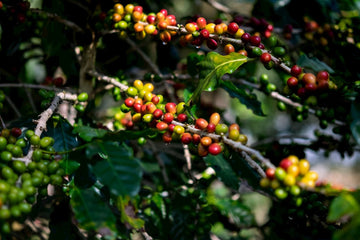Have you ever heard a barista tell you "The higher the altitude, the better the coffee"? So what does altitude have to do with the coffee we drink? Why is altitude so important for coffee? Can altitude determine quality of coffee?
Why is altitude important?
Here, the altitude is the altitude at which the coffee grows. Altitude has no direct effect on coffee, but it can affect the growth and quality of coffee through meteorological elements (temperature, light, heat, wind speed, rainfall, etc.), which directly affects the size, appearance and taste of the beans.
On the other hand, altitude and climate also affect the choice of coffee growers. Arabica coffee generally prefers higher altitudes of 1,800 to 6,300 feet (600 to 2,000 meters), where the climate is warmer. The Robusta species prefers the lower altitudes of 600 to 2,400 feet (200 to 800 meters), where the climate is warm. The relationship between quality and altitude is obvious.
Why is coffee better at higher altitudes?
Generally speaking, coffee tastes better the higher it is grown. If properly maintained, coffee grown at high altitudes has a pleasant acidity, strong aroma and rich taste; Coffee grown at lower altitudes, on the other hand, has little acidity and is flat and bland. That's why baristas always emphasize altitude.
Of course, in terms of personal taste, for people who like fruit acidity and don't require high concentration, high-altitude coffee is certainly the most suitable; For people who don't like acidity and need a high concentration of coffee, however good the quality of high-altitude coffee is, it doesn't matter. Instead, low-altitude coffee is more suitable. Therefore, the choice of altitude should be based on personal taste.
How to determine the altitude at which coffee grows?
The most sought after coffee beans are strictly hard beans typically grown above 4,500 feet (1,500 meters). These beans grow very slowly, so they are very dense. They should have a closed fissure line that might be zig-zagged or slightly skewed. On the other hand, lower elevation coffee beans will generally be less dense, with a semi-open fissure.
However, besides the growing environment, the color of the bean body is also related to the processing process of the raw bean, so it cannot be used as the sole basis to judge the altitude.
The market value of high-altitude coffee
High-altitude coffee grows more slowly, so it accumulates more material in the beans, tends to have more distinctive flavor vitality, and is more likely to be higher-quality coffee. The more flavor, the more resilient the beans are to subsequent treatment.
On the other hand, the lower yield per tree at high altitudes, combined with the higher cost of sale challenges faced by coffee farmers in remote mountain areas to produce and sell their crops, tend to result in higher market prices for these coffees.
In short, there is nothing wrong with the saying,"The higher the altitude, the better the coffee".
For coffee beans that can grow at an altitude of more than 1500 meters or even 2000 meters and still bear fruit and have commercial value, from the objective point of view, the quality of the beans themselves is not bad.
Although the altitude is only a factor that shapes the overall flavor characteristics of coffee, please pay more attention to the altitude information of coffee beans when buying raw beans or cooked beans, and according to your own taste requirements, the distribution of producing areas, climate characteristics and other comprehensive analysis, through the taste and comparison to find the most suitable for your own coffee.
Works Cited
Perfect Daily Grind. “The Effect of Altitude on Coffee Flavor”June 29,2015, www.perfectdailygrind.com/2015/06/how-does-altitude-affect-coffee-and-its-taste-in-the-cup/
Scribblerscoffee. “How Does Altitude Affect Coffee and Its Taste in the Cup?” Judy Fleisher, October 16,2017, www.scribblerscoffee.com/blogs/news/the-effect-of-altitude-on-coffee-flavor






